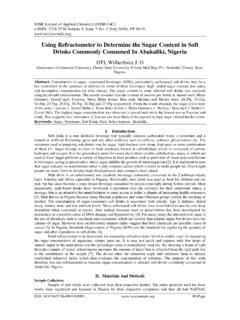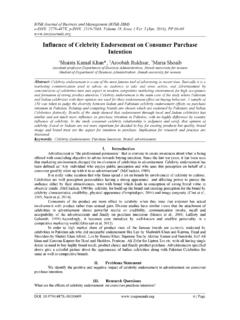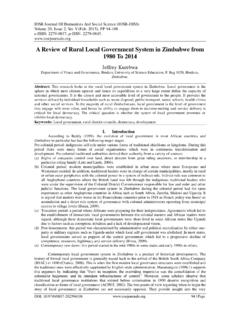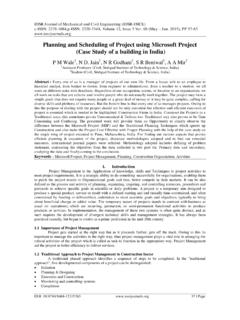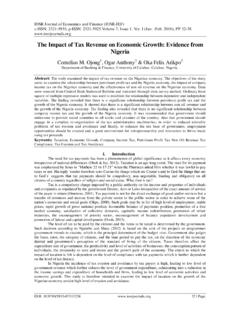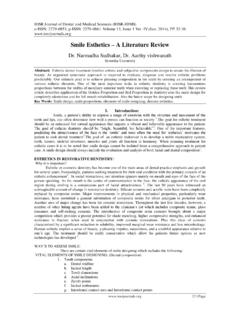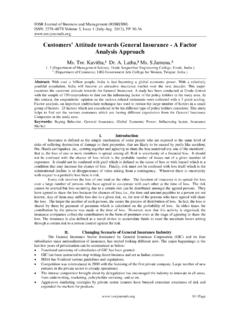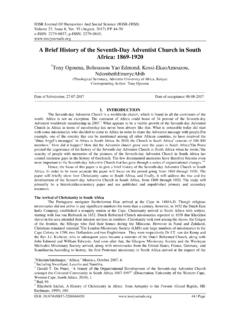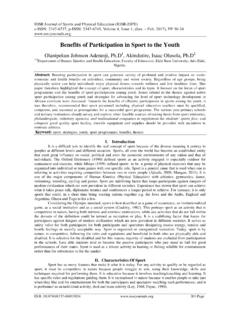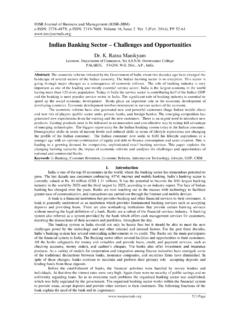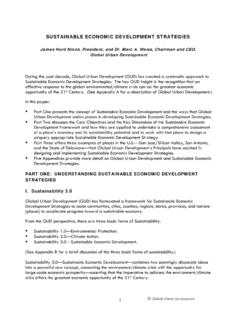Transcription of Entrepreneurial Leadership Questionnaire: …
1 IOSR Journal Of Humanities And Social Science (IOSR-JHSS) Volume 22, Issue 5, Ver. 6 (May 2017) PP 05-11 e-ISSN: 2279-0837, p-ISSN: 2279-0845. DOI: 5 | Page Entrepreneurial Leadership Questionnaire: Confirmatory Factor Analysis Evidence from School Context Abbas Sani Dahiru1, ZaidatolAkmaliah Lope Pihie2, Ramli Basri3 and SitiAishah Hassan4 Federal University Gusau, Nigeria1 Universiti Putra Malaysia, 43400 Serdang, Selangor, Malaysia2, 3 and 4 Abstract:- Objective: The main objective of the study is to ascertain the reliability of Entrepreneurial Leadership questionnaire (ELQ) among secondary schools in Zamfara State- Nigeria through teacher s perspectives.
2 Methodology: Structural equation modeling (SEM) AMOS using confirmatory factor analysis was adopted in this study. Total of 395 samples were chosen through multi stage random sampling technique as participants in the research. Data were collected through the administration of adopted instruments from previous researchers. Findings: The Data was analyzed using Structural Equation Modeling (SEM) with AMOS graphics. Preliminary and subsequent assessments of model fits were conducted which fell within the acceptable threshold, and indicates the data fits the model (762) = , p= , /DF= , GFI= ; TLI= , CFI= ; IFI= , RMSEA= Conclusion: The findings indicated that the ELQ was highly valid and reliable to measure Entrepreneurial Leadership practice among secondary school teachers in Zamfara state, Nigeria.
3 Keywords: Confirmatory Factor Analysis, Entrepreneurial Leadership , School, Teachers I. INTRODUCTION Entrepreneurial behaviors are gradually gaining popularity in a variety of contexts. In organizations, these behaviors promote innovation and adaptation to the dynamic environments. Entrepreneurial Leadership is a unique Leadership practice that entails influencing the activities of an organization irrespective of its type, size and age with the aim of achieving the organizational goals (House et al., 1999). This Leadership style assists leaders in guiding people towards the realization of the organizational vision and overcoming impediments that may pose a challenge to the organizational growth (Roomi & Harrison, 2011).
4 Therefore, Entrepreneurial leaders internalize and display their abilities to recognize new opportunities for the effective performance of their respective organizations (Bagheri, Lope Pihie, & Krauss, 2013). The central impact of Entrepreneurial Leadership behavior on improving Leadership effectiveness and organizational performance is increasingly receiving attention by scholars in order to improve various aspects of organizational effectiveness (Xaba &Malindi, 2010; Berglund & Holmgren, 2006; Collins et al., 2004; Eyal, &Kark, 2004; Eyal&Inbar, 2003). According to Akinola (2013) Entrepreneurial Leadership has shown effective strength in the development of organizational effectiveness therefore, it is of paramount importance for organizations to enjoy the benefits of the innovative and proactive Leadership practice.
5 The concept of entrepreneurship is an emerging concept in the arena of educational Leadership . It is referred to as an innovative process of new vision, change and creation. It entails the display of some acts that are not traditionally common or being practiced in the course of managing an organization (Ezeani, 2012). Therefore, the role of the school leader in Entrepreneurial Leadership process of confidence building, being proactive and his ability to effectively communicate the vision of the school to all stakeholders will translate to an efficient and effective system (Ezeani, 2012).
6 This justifies that, Entrepreneurial characteristics and skills can be used in the process of improving school Leadership by way of influencing the conduct of individuals operating in a school setting (Berglund & Holmgren, 2006). As a result, there is the need for school heads (principals) to not only acquire but at the same time put in to use the skills of Entrepreneurial Leadership for the attainment of school effectiveness as well as the enabling of school innovation practice (Hamzah, Yusof, & Abdullah, 2009). Despite the fact that organizations are beginning to appreciate the role of Entrepreneurial Leadership towards the attainment of organizational goals, yet, there has been continuing debate on the reliable instrument Entrepreneurial Leadership Questionnaire: Confirmatory Factor Analysis DOI: 6 | Page to measure Entrepreneurial Leadership behavior (Yusof, 2009).
7 Furthermore, majority of the instruments focused mainly on limited aspects of educational leader s Entrepreneurial Leadership behavior (Yusof, 2009). In response, this study aimed at ascertaining the reliability of Entrepreneurial Leadership questionnaire through teacher s perspectives. II. LITERATURE REVIEW Concept of Entrepreneurial Leadership Entrepreneurial Leadership as a new concept in the field of Leadership have witnessed diverse opinions as regards to its conceptualization (Roomi & Harrison, 2011). Some scholars have taken in to consideration the links between entrepreneurship and Leadership and defined the concept as Leadership style in multidimensional and stimulating environments (Renko, El Tarabishy, Carsrud, & Br nnback, 2015).
8 Entrepreneurial Leadership involves the Leadership s ability to influence and guide the performance of group members toward the achievement of organizational goals that involve identifying and utilizing opportunities (Renko et al., 2015). By integrating the views of other scholars on the meaning of the concept Entrepreneurial Leadership (Roomi & Harrison, 2011) defined the concept as the ability to communicate and involve groups to recognize, improve and take advantage of opportunity in order to gain competitive benefit. Practicing Entrepreneurial practices by leaders and Leadership values by entrepreneurs have one common goal of dealing with the tasks and dilemmas of existing organizational settings and eventually improving the effectiveness of the leaders (Cogliser & Brigham, 2004).
9 Entrepreneurial Leadership has been defined as Leadership style distinctive from other types of Leadership conducts essential in highly unsettled, inspiring and competitive organizations (House, Hanges, Javidan, Dorfman, & Gupta, 2004).The diverse nature of the literatures on Entrepreneurial Leadership is the possible reason for the challenges in defining of the concept itself. The perspectives are clustered into four main Categories that include; the link between the concepts of entrepreneurship and Leadership , psychological approach, context of application and lastly overview of the construct without really defining it.
10 However, despite the different approaches in defining the concept, it is clear that the role of Entrepreneurial Leadership behavior in improving Leadership effectiveness and decision-making has gradually received great attention by scholars with a view to improving the effectiveness of organizations. Models of Entrepreneurial Leadership Entrepreneurial Leadership is gradually receiving emphasis from researchers. Hence, there is an increase in researches aimed at discovering and models that explain Entrepreneurial Leadership (Cogliser & Brigham, 2004). Some of the models for Entrepreneurial Leadership are; 1.
